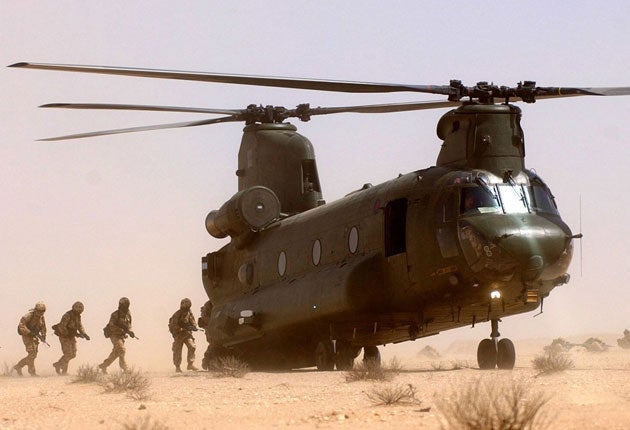Helicopter protection of troops questioned

Your support helps us to tell the story
From reproductive rights to climate change to Big Tech, The Independent is on the ground when the story is developing. Whether it's investigating the financials of Elon Musk's pro-Trump PAC or producing our latest documentary, 'The A Word', which shines a light on the American women fighting for reproductive rights, we know how important it is to parse out the facts from the messaging.
At such a critical moment in US history, we need reporters on the ground. Your donation allows us to keep sending journalists to speak to both sides of the story.
The Independent is trusted by Americans across the entire political spectrum. And unlike many other quality news outlets, we choose not to lock Americans out of our reporting and analysis with paywalls. We believe quality journalism should be available to everyone, paid for by those who can afford it.
Your support makes all the difference.A shortage of helicopters is undermining the "protection" of troops in Afghanistan, an influential group of MPs warned today.
The Commons Defence Select Committee also said that key battlefield operations were being inhibited due to a lack of air transport.
The Ministry of Defence must increase the number of helicopters and train more crew, the MPs argued.
The criticisms came in a specially-produced report, amid a furious row over military equipment sparked by the deaths of 15 UK service personnel in Afghanistan in just 10 days.
Prime Minister Gordon Brown has insisted it is "absolutely clear" that the heavy death toll recently has not been due to a shortage of helicopters.
But committee chairman James Arbuthnot said: "It seems to us that operational commanders in the field today are unable to undertake potentially valuable operations because of the lack of helicopters for transportation around the theatre of operations.
"We are also concerned that operational commanders find they have to use ground transport, when helicopter lift would be preferred, both for the outcome and for the protection of our forces."
The committee said improved maintenance and support structures had been "paying dividends" in terms of the available flying hours for helicopters such as the Chinook in theatre.
But it added: "Nevertheless, helicopter capability is being seriously undermined by the shortage of helicopters, particularly medium-lift support helicopters, capable of being deployed in support of operations overseas.
"We believe that the size of the fleet is an issue, and are convinced that the lack of helicopters is having adverse consequences for operations today and, in the longer term, will severely impede the ability of the UK Armed Forces to deploy."
The MoD's plan to bridge the "capability deficit" by patching up "ageing" Sea Kings and Pumas before the introduction of a new generation of helicopters was "not the best option, either operationally or in terms of the use of public money".
"Only a procurement of new helicopters can meet the original objective of reducing the number of types of helicopter in service within the UK Armed Forces," the MPs insisted.
Referring to concerns about the military's ability to protect troops and undertake key operations with current helicopter availability, the MPs said: "We are troubled by the forecast reduction in numbers of medium and heavy lift battlefield helicopters, which will make this worse."
The committee warned that the intensity of the campaign in Afghanistan had "stretched the manning of the helicopter fleet".
"It is therefore unfeasible to surge helicopters into theatre," it added.
There were also worries that crews were training in aircraft which did not have the same equipment as those in the combat zone.
"It is unacceptable for personnel to encounter new equipment for the first time in theatre," the report said.
Shadow defence secretary Dr Liam Fox said: "It is now irrefutable that Labour's £1.4 billion cut to the helicopter budget in 2004, in the middle of two wars, has had an extremely serious impact on the number of helicopters available for operations in Afghanistan, and potentially on future operations.
"Now, when we need more vital equipment, the cupboard is bare.
"No amount of evasion and creative accounting can disguise the fact that our troops are being let down. Gordon Brown was never willing fully to fund Tony Blair's wars and our troops are paying the price for that."
Join our commenting forum
Join thought-provoking conversations, follow other Independent readers and see their replies
Comments